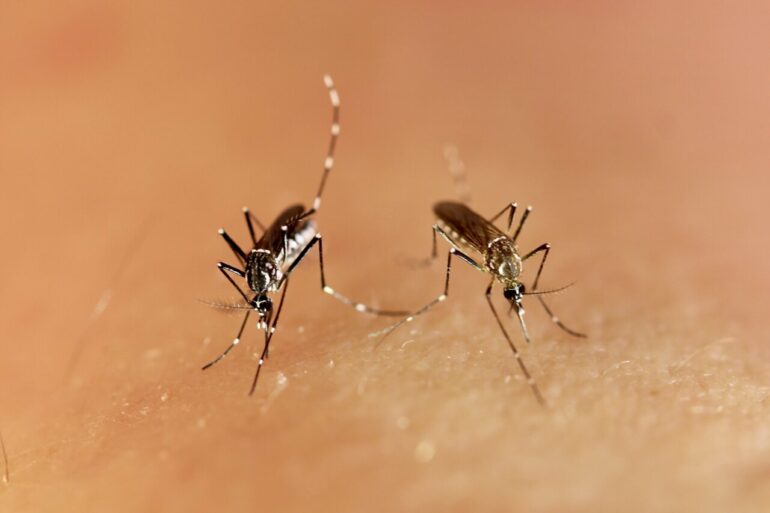A study reveals that Africa’s low rates of Zika virus outbreaks may be due to a surprising factor: the genetic makeup of local mosquito populations.
Research by scientists at the High Meadows Environmental Institute (HMEI) at Princeton University, Institut Pasteur, and University of California, San Diego shed light on why Zika—responsible for birth defects and devastating outbreaks across the Americas from 2015–2016—remains relatively scarce in Africa, the continent where it was originally discovered. The study was published in The Lancet Planetary Health on December 11.
A team of researchers, led by Dr. Jamie Caldwell, an Associate Research Scholar at HMEI, found that Africa’s native mosquito populations may hold the answer.
“The mosquito species that spreads Zika has two forms, each with different feeding preferences and capacity to transmit the disease,” Caldwell explains. “This genetic difference could explain why Zika has largely spared Africa despite the continent’s large mosquito populations and climate conditions favorable to mosquito activity.”
The two mosquito forms vary in their feeding habits and transmission capabilities. The human specialist form are well-known for their preference to bite humans and tendency to inhabit densely populated urban areas. In contrast, the African ancestral form, which dominate in Africa, are “generalists” that feed on both humans and animals.
The mixed diet lowers the chances of an infectious mosquito biting a human. Additionally, the African ancestral form are less effective at acquiring and transmitting Zika than their human specialist counterparts, leading to a natural barrier that reduces the spread of Zika virus in Africa.
Both forms live in Africa, but the amount of variation within mosquito populations might account for the variation in Africa’s Zika burden, the researchers suspected. Alternatively, temperature could be responsible for the low disease burden: while many parts of sub-Saharan Africa have the ideal climate for Zika virus transmission, areas with temperatures too hot or cold for the virus might restrict its spread.
Climate is considered one of the primary drivers for the distribution of other diseases spread by the same mosquito species, such as dengue and yellow fever, because it influences many factors important for transmission, such as how often mosquitoes bite and how fast they develop into human-biting adults.
The researchers developed models that considered genetic effects on mosquito-biting preferences and capacity to spread the virus, as well as the role of temperature in affecting mosquito development, survival, and transmission capacity.
They found that mosquito population genetics influence Zika transmission in Africa more strongly than climate, thus the proportion of the human specialist mosquitoes in different populations across Africa closely resembled the Zika virus burden across the continent.
However, climate change and rapid urbanization may make African cities more vulnerable to Zika virus outbreaks in the future. Caldwell’s team estimated that among 59 African cities with a population over 1 million, 23 cities, or 39%, meet the right conditions for a Zika outbreak.
Discover the latest in science, tech, and space with over 100,000 subscribers who rely on Phys.org for daily insights.
Sign up for our free newsletter and get updates on breakthroughs,
innovations, and research that matter—daily or weekly.
If current climate and population growth projections, and their predicted effects on the mosquitoes prove accurate, an additional 22 cities will become suitable for Zika emergence, bringing the total to 76% of the most populous African cities.
“Our research underscores the urgent need for mosquito surveillance, especially in cities with rapidly growing populations,” says Dr. Noah Rose, co-author of the study who first contributed to this research as a post-doc at Princeton and is now Assistant Professor at the University of California, San Diego.
The findings emphasize the importance of proactive public health measures to monitor and control mosquito populations in Africa’s growing urban centers. The research shifts the narrative on Zika’s global spread and highlights how climate change could alter disease dynamics in unexpected ways.
More information:
The Lancet Planetary Health (2024). www.thelancet.com/journals/lan … (24)00276-6/fulltext
Provided by
Princeton University
Citation:
Mosquito genetics may explain why Zika virus outbreaks are rare in Africa: Climate change could shift the balance (2024, December 11)


